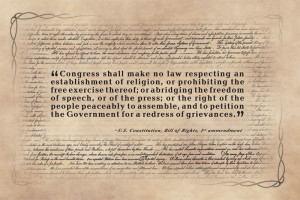As court interpreters, we have to be ready for all kinds of terminology. Speaking styles too. A register that rises to the level of Shakespearean sonnets , or drops to a Mafioso style threat. We have to render it duplicating the tone, style and meaning. So, we study and prepare. I enjoy sitting in on trials and study how the lawyers speak especially during opening and closing.
But none of that prepared me for the lawyer who sang during his closing argument.
I was interpreting the trial for the defendant. It was a car accident and my client was the insurance company. It was all so standard that I don’t remember the details or most of the testimony. The opposing counsel was well prepared and consistently …normal sounding during litigation. Nothing stood out during voir dire or cross or even the deliberations over the charge to the jury. A bit of drama during that would have tipped me off.
I wasn’t even distracted by the Plaintiff’s father who wore in a full Marine dress uniform throughout the trial. He sat behind his daughter, a high school senior.
I was interpreting the full trial for the defendant, a middle aged man from Honduras. He was calm, polite and…normal.
I remember being aware that since we were at closing arguments, all that was left, time wise, was jury deliberations and then I’d be released. Frankly I was probably thinking about dinner plans.
For closing, both lawyers restated the high points of the case that reflected well on their client. And the lawyer for the plaintiff, as usual, proceeded to follow the defense with a second closing. In this one he reminded the jury of the testimony presented showing how his client was very close to her father and that her father had been very worried about her ever since this accident. And that her father was an honorable member of the military.
The lawyer stopped right in front of the jury, looked right into their eyes and asked them,
“Who today isn’t aware of the contributions of the military to our country? It just makes me think of the song, Some Gave All by Billie Ray Cyrus ”
Then in a pretty nice baritone voice he sang these words:
“All gave some and some gave all / And some stood through for the red, white and blue / And some had to fall / And if you ever think of me / Think of all your liberties / And recall, some gave all.”
He caught me off guard for a second. I may have shown surprise on my face. But I got right to work interpreting ….not singing…. the lyrics. I avoided eye contact with the defendant and I focused on the wood grain of the table while interpreting simultaneously. But out of the corner of my eye I caught my client’s jaw drop. There was no reaction from the Judge and the jury didn’t applaud.
I have been surprised by literary testimony that included poetry and recitations from religious texts. I guess I can add interpretation of live singing to my own repertoire, so to speak.
I’m just glad he didn’t choose Achy Breaky Heart.
(Some Gave All. (C) 1993 Mercury Records, a Division of UMG Recordings, Inc)

